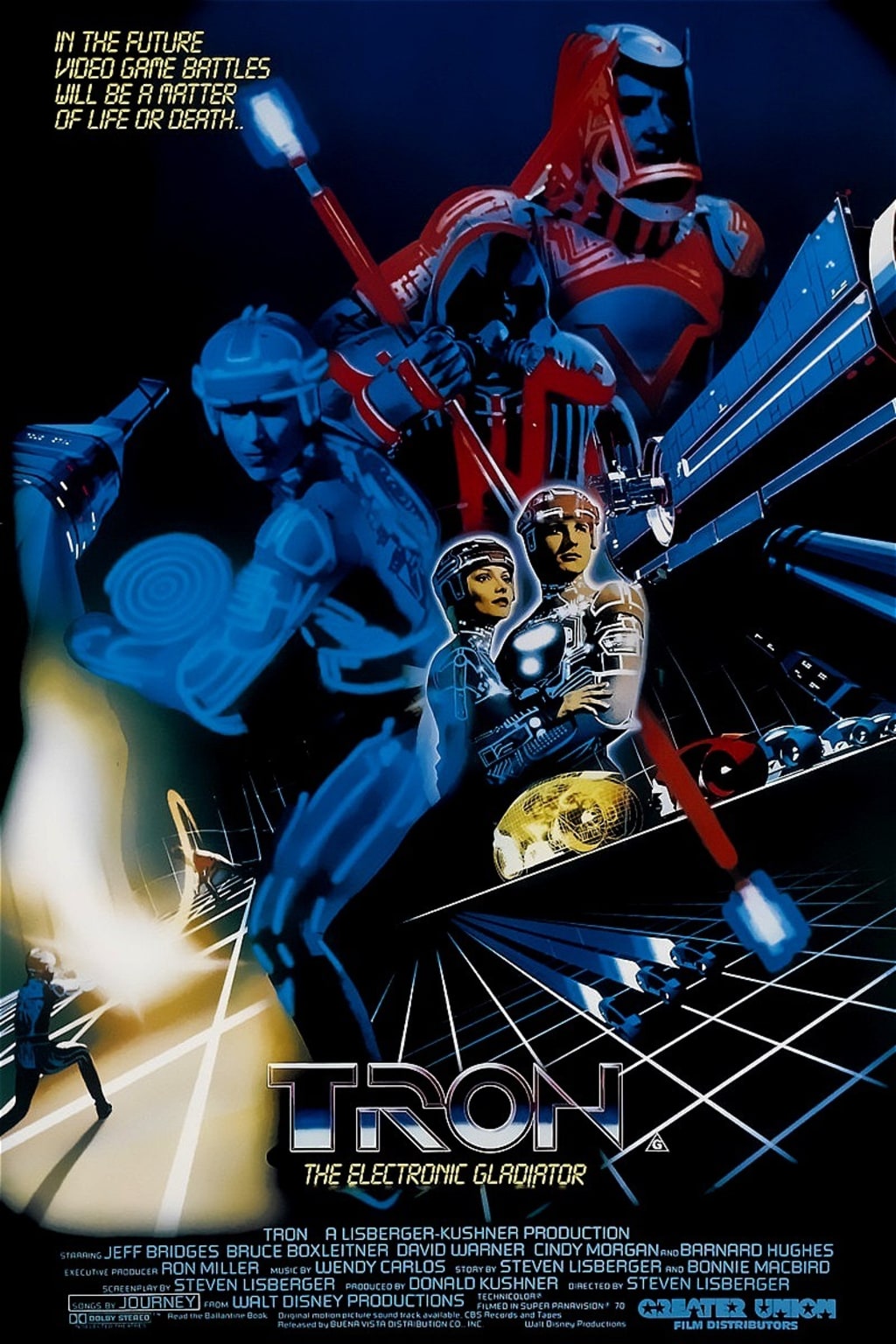
Tron is one of my all-time favorite movies, a sci-fi feast that takes place inside a video game world ruled over by the MCP (Master Control Program), a world wherein gladiatorial "programs" battle it out for supremacy, riding rainbow-spewing laser bikes, and going up against floating robot menaces that transform their legs into giant crushing, killing presses. The world is stark, yet weirdly beautiful, an outgrowth of the imagination that conceived a cyberspace realm and brought it to life for the characters to occupy as alternate versions of their meatspace selves. It was groundbreaking stuff in 1982; hence, it flopped at the box office, only attaining cult status in the intervening years, as technology has caught up with and surpassed the virtual world envisioned by the filmmakers.
Kevin Flynn (Jeff Bridges) is a hotshot computer programmer who owns an arcade and poolhall and hacks into the mainframe of ENCOM, a company he once worked for which is now run by Ed Dillinger (the late, great David Warner) an ever-villainous rogue who stole Flynn's video game designs to further his career up the corporate ladder. Dillinger realizes that the MCP has become a virtually sentient AI gobbling up various programs and incorporating them in a database in furtherance of its own megalomaniacal thirst for control over the entire system. Alan, along with Flynn's ex-gal pal Lora (Bruce Boxleitner and Cindy Morgan) go to warn Flynn that the MCP is onto his hacking. Returning to ENCOM, they install Flynn at a terminal to get the evidence he needs of Dillinger's theft of his videogame designs.
Unfortunately for Flynn, the MCP gets wise to this right away, and, using an experimental teleportation laser, Flynn gets zapped and uploaded into the cyberspace realm, a stark and minimalist arcade game nightmare world wherein he must battle royale other "programs" for survival. Here, Dillinger's alter-ego is the equally malevolent Sark, who runs the gladiatorial games on behalf of the giant grid-like face of the MCP, who is always threatening (as every evil genius mastermind does in such films) to pull the plug on Sark for continued incompetence.
Flynn hooks up with Ram (Daniel Shor) and Tron (Boxleitener in a dual role as both Alan and the program he creates), and the trio competes on the light cycles, throwing their glowing videogame superhero discs and battling the various early CGI manifestations of the "game grid" battlefield.
Sark and the MCP are trying desperately to corral and control all the stray programs; hence, they are constantly referring to programs that believe in the "Users" (those who wrote them) as "religious fanatics. Flynn of course is a User, and when Ram and Tron realize this, they journey to the equivalent of a wise old sage or wizard, Dumont, (Barnard Hughes), and he helps Tron to communicate with his alter-ego Alan. Alan informs him of how he can destroy the MCP, and make it a "free system" once more.
Tron is such a guilty pleasure, such a trip back to childhood and the wonder and adventure of a simple science fiction tale of good versus evil, but one not set in a "galaxy far, far away." Instead, Tron took a bold leap forward, incorporating the earliest, most primitive CGI effects, anticipating the future. other films, such as Young Sherlock Homes and The Last Starfighter, would quickly follow its lead, but none of them would have the same immersive visual appeal as Tron, which created a world worthy of the boldest visionaries of science fiction. (Indeed, one of the graphic designers of this film is none other than Jean Giraud, a.k.a. "Moebius," the late artist most famous for his work popularizing the French adult comics magazine Metal Hurlant, or Heavy Metal.)
Tron hearkens back to a time, an era, when, cusped upon the edge of technology, we wondered at how the future of computing might evolve, and could not have foreseen the way it would grow to dominate aq society that now lives every waking moment of its life "online." The implicit fear and gradual awareness of the future we were moving toward fueled the fantasies and terrors of films like Tron, and lesser films such as Evilspeak and The Dungeonmaster, which had roughly the same themes. Tron was aimed at an adventure audience; the other films are horror films, but the tension and the fear of rapidly developing technology is the same and is with us to this day.
Tron is completed by an incredible soundtrack by Wendy Carlos, with additional songs by Journey (including the very catchy "Only Solutions" which seems to summarize the themes of anxiety at the encroaching modern world). Carlos also provided soundtracks for Kubricks' films A Clockwork Orange (1972) and The Shining (1980).
Written and directed by Steven Lisberger with Bonnie MacBird, after Lisberger became fascinated with video games, his initial exposure being to Pong.
The Making of Tron 1982 Full Documentary
About the Creator
Tom Baker
Author of Haunted Indianapolis, Indiana Ghost Folklore, Midwest Maniacs, Midwest UFOs and Beyond, Scary Urban Legends, 50 Famous Fables and Folk Tales, and Notorious Crimes of the Upper Midwest.: http://tombakerbooks.weebly.com
Enjoyed the story? Support the Creator.
Subscribe for free to receive all their stories in your feed. You could also pledge your support or give them a one-off tip, letting them know you appreciate their work.






Comments (1)
Yeah, if you had panned "Tron" I would have had to question your sanity. Great review.